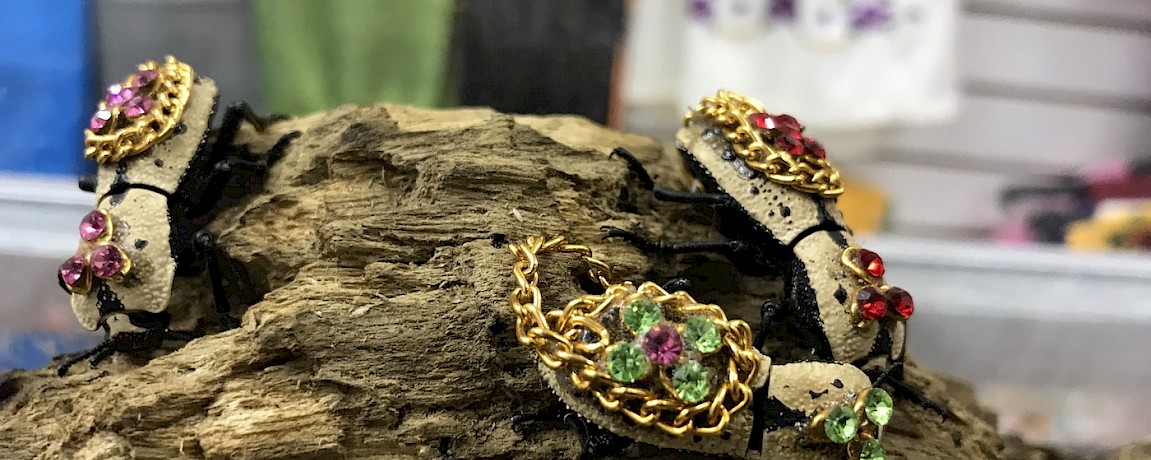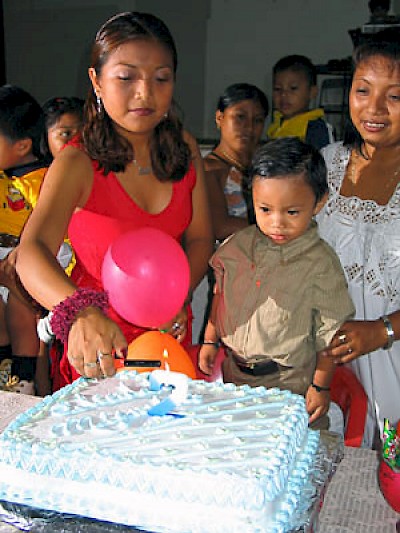What's in a (Spanish) Name?
If you aren't an aficionado of all things Mexican (which we weren't when we first moved to Yucatan), during your first few months of living here, you will meet people with names that are unfamiliar. Some of them are cute, some are funny and some are just downright odd.
Let's start with Spanish names. In our pre-Working Gringo days in California, we were familier with names like Jose, Jorge or Maria because California roots are, after all, Mexican. We suspect that perhaps many of the Mexicans we came in contact with may have adopted these more normal Spanish names to make life easier for themselves.
Upon immersing ourselves in Yucatan, we were confronted with names like Socorro, Izauro, Santiago and Ignacio... names that were definitely new to us. Some of these names (like the ones just mentioned), we found rather beautiful. Working Gringa's Spanish name is Elena, yet another beautiful name. But Working Gringo's name translated into Spanish has not been quite so painless. While "James" is a perfectly fine name in English, the Spanish version of James (pronounced "Hah-mess") is rather uncommon and not quite so pleasing. What's more, the alternative of Jaime always raises a chuckle from our Spanish-speaking friends - we're not sure why. Apparently, Santiago also means "James" and Working Gringo has found that much more amenable.
Of course, if you don't like your name, there is always the option of a nickname. Nicknames are popular here, but connections to their antecedents have not always been obvious to us. Here are some Mexican nicknames that we have run across and the "given" names that they are related to:
- Jesús (a common name here) becomes Chucho
- José becomes Pepe
- Ignacio becomes Nacho
- Socorro becomes Soco or Coco
- Maria Elena becomes Malena
- Eugenia becomes Genny (pronounced "Henny")
- Beatriz becomes Betty
- Concepcion becomes Conchi
- and so on...
Then there are the stranger dimunitives. There is a popular hardware store in the Yucatan named Boxito. From our Mayan language studies, we have learned that box means "black" and the Spanish suffix -ito means "little". As it turns out, we were right! Boxito is a nickname given to a little guy who has dark skin. It is a dimunitive name, given out of affection or familiarity, not out of disrespect. And it was probably the nickname of the man who started this very successful chain of stores. Other dimunitives in that vein are Flaco (skinny man), Gorda (fat female), Gordita (little fat female), Guera (white woman), Guapo (handsome man), Rubia (blonde woman). And of course, just change the "a" to "o" or vice-versa, and the name gets a sex change. Fun and easy!
While we're on the subject, the habit of adding dimunitives to names is a charming one and we're not sure how we lived without it before now. Mama becomes mamacita, abuelo becomes abuelito, gata becomes gatita and the list goes on ad infinitum. If you work at it hard enough, you can add -ito or -ita to almost anything and that thing is suddenly little, cute and endowed with charm and endearment. Of course, this is also used for names: Lupe becomes Lupita (at least one cafe in every town in Mexico is Cafe Lupita), Estrella becomes Estrellita, Angel becomes Angelito, etc.
But our favorites are the names we would never have thought of in a million lifetimes. Our assistant, the Amazing Beatriz, has told us about people she has met (more than one!) named Annirev. We pondered over that for a few minutes when we heard it but she finally had to tell us that it is the abbreviation for Anniversaire de Revolución (The Anniversary of the Revolution), which is the way the holiday on November 20 is often presented on a calendar.
We ourselves have met more than one young woman named Leydi Diana. All the Leydi's we have met seem to be in their early twenties... hmmm! Certainly not a coincidence.
The Amazing Beatriz also told us about a story she read in the local paper a few years back. There was a local whose name was Onecent (pronounced "OHN-neh-sent"). We puzzled over this one too but she told us not to bother. The story was that the father of Onecent had been out in the milpa (corn field) one day, and he had found a coin on the ground. On it, the coin had the letters ONE CENT and when his son was born later that day, he was so named. He could have been named Ingodwetrust ("een-gohd-WAY-troost") but that probably didn't trip off the tongue quite so lightly.
When we were researching this article, we found a story from last summer about the Mexican government cracking down on "strange" baby names, trying to save their little citizens (paisanitos?) from future embarassment in the schoolyard. Apparently, inventive names are a Mexican tradition and a custom that we think is rather endearing. Adorable. Charming. It's a customita! (Okay, so it doesn't work all the time...)
Have you heard any interesting names here in the Yucatan? Please tell us... we're fascinated!









Comments
lizbeth campos 13 years ago
How about one for a pablo? I need a sweet nick name for My new husband
Reply
Howard 15 years ago
That's cute about Pepe standing for "Padre Putativo," but I'm sure it's not true. Jose comes from the Latin Josephus (from Hebrew Yosef) so I'm sure there was some intermediate stage when people were called Josepo or Josepe or something like that. (Ph was pronounced more or less like p in Latin.)
As for Nancy, a lot of English names were originally nicknames (Beth, Betsy, Eliza, Betty, Elise etc. for Elizabeth) so you have to go back to the original. I think Nancy is a nickname for Anne (Hebrew Hannah), which is Anna in Spanish.
Reply
B'zZZzz. 15 years ago
My half brother's name is Humberto and my family calls him beto.
Reply
Abhishek 15 years ago
actually i liked Spanish languae but haven't learned it yet and i want to know my name in Spanish version.
Reply
Abhishek 15 years ago
actually i liked the Spanish language and wanted to know my name in Spanish version.
Reply
TheresaJPadilla 15 years ago
I lOVE MY HERITAGE. I HAVE THE BEST OF BOTH WORLDS.I AM 100% PURE PADILLA. MY FATHER WAS FROM MEXICO, ZACATECAS. MY MOTHER FROMMBARCELONA, SPAIN. THEREFORE. MY LITTLE HISTORY IS GRAND. CUZ MY MOTHERS MAIDEN WAS ALSO PADILLA. THEREFORE MAKES ME A100% PADILLA. AND A LITTLE MORE BIT OF HISTORY. THERES A BARRIO, IN ALBUQUERQUE,NEW MEXICO. (CALLED LOS PADILLAS). WHICH MY GREAT GRANDFATHER FROM MY MOTHERS SIDE FOUNDED. AND THATS WHERE I AM FROM. BOTHE BEST WORLDS. AND100% PURE PADILLA!!!!!!!!!!!!!!!!!!!!!!!!!!!!!!!!
Reply
Maya 15 years ago
hello! I'm Maja and I have problems with aliases. I do not want to call me Maya, Maychy, Maych but a little differently. you have any suggestions about my name? I ask because when I am large, I apparently became a singer, but don 't know how to call. Thanks in advance. I very glad of your responses. Maya
Reply
fabio fortuna 16 years ago
My name (Fabio) is Italian, so no big deal,as generally Italian names and Spanish ones are very similar, but Fabio is NOT common in Spanish speaking countries, although it is a common name in Brazil. People tend to misunderstand it into 'Flavio' which is a common name in Italy AND in Spanish speaking countries....or misspell my name writing it with B chica (v) rather than B grande (b)....
as for Santiago from Diego ? I believe Diego is a totally different name (common in Italian and Spanish) from Jaime - and that actually Santiago comes from Jaime or James in English.....but this is as far as I know.
Reply
Maddalena 16 years ago
Hi, my new baby brother is named Jorge, is Jorgito a nickname for Jorge?
Reply
ELSY NOEMI DEL PERPETUO SOCORRO 16 years ago
I love the way you all experienced with your names in Yucatan. It is so true that it is a learning experience about the nick names and the ones ended in "ito" and "ita". My grandmother called me Elsita. When my mother was mad at me, she will call me my full name Elsy Noemi del Perpetuo Socorro te estoy hablando!! Just to hear that I knew I was in trouble.
Anyway, I just want to add to your beautiful comments that when someone refers to a person who is not of her/his favorite...in Yucatan we add: x (sh)
Example: I would call you Sh-James or Sh-Maria, or you would call me Sh-Elsy, etc.
If you refer to a little child, you might say "Chan-Santiagito" or "Chan-Elsita" , Chan-Bonita, etc.
Learning about the culture of names is so interesting, I see that you all have fun with it, and I am glad.
By the way "sh" is a short form of saying `ixlá¨which in Mayan Language means ¨porqueria¨ or ¨despicable¨ or ¨no-good¨... Interesting?
How about the word :re-patea el alma? this is your homework. Have fun my friends in Yucatán. Yours truly ¨Chan-Elsy¨
Reply
Brooklyn 16 years ago
Hey guys! I have always wondered what my name is in spanish :) . I love the cite... My name has always been unique so here it is .... Brooklyn Delana or Brook. My dad has nicknamed me Bonita which i have found out to be a good thing because it means Beautiful little one. Thanks guys!
Reply
(0 to 11 comments)Next »